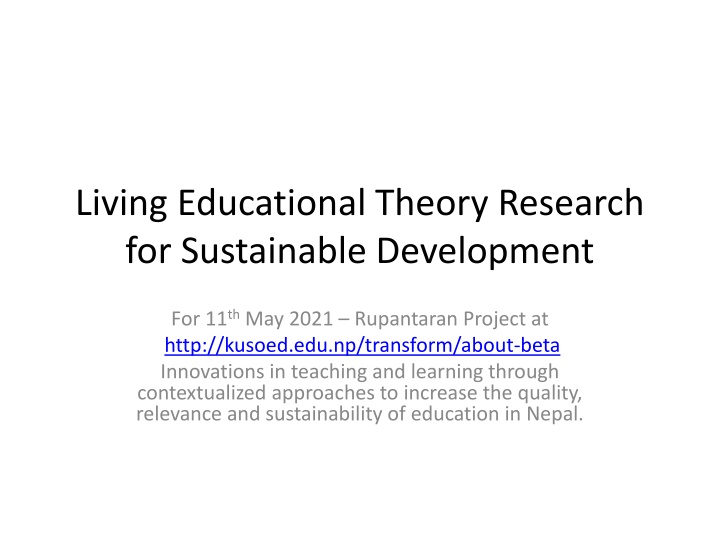
Innovative Educational Research for Sustainable Development in Nepal
Explore the Living Educational Theory Research for Sustainable Development in Nepal through the Rupantaran Project. Discover innovative teaching and learning approaches to enhance the quality, relevance, and sustainability of education. Engage in group discussions, form initial research questions, and collaborate to improve practices for sustainable development.
Download Presentation

Please find below an Image/Link to download the presentation.
The content on the website is provided AS IS for your information and personal use only. It may not be sold, licensed, or shared on other websites without obtaining consent from the author. If you encounter any issues during the download, it is possible that the publisher has removed the file from their server.
You are allowed to download the files provided on this website for personal or commercial use, subject to the condition that they are used lawfully. All files are the property of their respective owners.
The content on the website is provided AS IS for your information and personal use only. It may not be sold, licensed, or shared on other websites without obtaining consent from the author.
E N D
Presentation Transcript
Living Educational Theory Research for Sustainable Development For 11thMay 2021 Rupantaran Project at http://kusoed.edu.np/transform/about-beta Innovations in teaching and learning through contextualized approaches to increase the quality, relevance and sustainability of education in Nepal.
Welcome and introduction 10 minutes Welcome and Introduction from Jack to the session - purposes and structure (use of chat etc),
Contexts, fields of practice and research of others engaged in Living Ed Theory research 5 minutes - show how to access from your site... https://www.actionresearch.net/writings/posters/homepage 2021.pdf - point to groups they could be one eg. Mongolian's, Malay's participants could have a presence... point to individual's living posters to exemplify different fields of practice etc and no right way of creating a living-poster eg. Pete Parbati s Mark's (global citizen, democracy cafe) , Swaroop (learning of Mark's work taken into context of social worker education and work in tribal areas), Ari's field of practice - international development, ... then Sigrid's living-poster to bring the participants back to their context...
small group of 3 Learning about contexts, fields of practice and research of other participants 10 mins in small group of 3 Learning about contexts, fields of practice and research of other participants in the Rapantaran Project (if they have created a living-poster themselves they could use that to focus - check with Sigrid if they can share screen in their small group)
Next step of Living Educational Theory research - forming an initial question 15 minutes participants to put their initial thoughts into chat some of which Jack can pick up on and shape with the person in conversation in the whole group as example of how a conversation might go in the small groups
In pairs helping each other to formulate their initial question 10 minutes in pairs helping each other to formulate their initial question related to researching to improve what they are doing for sustainable development
debrief in whole group and 30 minutes debrief in whole group to link with the nature of values as explanatory principles and standards of judgment - of practice and knowledge to bring into Academy for legitimation - and forms of data to clarify values emerging in the course of the research and to draw on as evidence to support their claim to be having an educational influence in the learning of... with examples... (including from Parbati, Shivanni and Swaroop and Sigrid... Sadruddin?) Work with questions in chat
Introduction to the resources 15 minutes (this could be shorter depending on how much time has been in small groups etc)- introduction to the resources on http://www.actionresearch.net and http:// www.spanglefish.com/livingtheory (we could add resources requested by them... in chat...if you like)
Plenary 20 minutes - what they individually and together intend doing next... with what they have learned about Living Educational Theory research for Sustainable Development
Concluding 5 minutes Conclude with summary of what emerged during the day and invitation to send their living-posters, questions through spanglefish contribute to building resources for global community?
